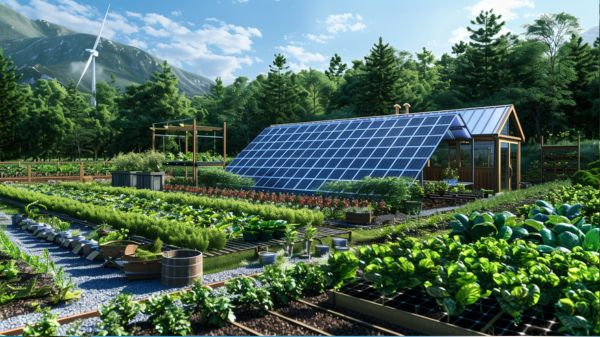When it comes to sustainable farming, incorporating the green tech tips can lead to significant improvements in agricultural efficiency and environmental impact. From precision agriculture tools to innovative farming techniques, these strategies offer a glimpse into the future of farming practices. Discover the benefits of green technology in farming and how they can revolutionize the way we cultivate crops and manage resources for a more sustainable tomorrow.
Key Takeaways
- Implement precision agriculture tools for optimized water usage and increased crop productivity.
- Utilize biotechnology for GMOs and CRISPR gene editing to reduce pesticides and enhance sustainability.
- Adopt innovative farming techniques like vertical farming and aquaponics to reduce water consumption.
- Integrate pest management strategies for natural pest control and reduced pesticide use.
- Embrace organic farming practices to promote soil health, biodiversity, and minimize environmental impact.
Precision Agriculture Tools
In sustainable farming, precision agriculture tools, such as drones and sensors, play an essential role in optimizing water usage and enhancing crop productivity. These tools contribute to sustainable agriculture practices by providing accurate data for informed decision-making, ultimately reducing the environmental impact of farming activities.
Through precise data collection and analysis, precision farming enables farmers to maximize crop yield while minimizing their environmental footprint. By utilizing wireless monitoring systems, farmers gain real-time control over irrigation, leading to improved efficiency in resource management. This technology not only minimizes water wastage but also reduces chemical usage, promoting eco-friendly farming practices.
Remote monitoring technologies further aid in minimizing environmental impact by ensuring that resources are utilized efficiently and sustainably. In essence, precision agriculture tools revolutionize traditional farming methods by offering innovative solutions for sustainable crop production.
Through their ability to optimize resource management, enhance crop productivity, and minimize environmental footprint, these tools pave the way for a more sustainable and eco-conscious approach to agriculture.
Biotechnology in Agriculture
Biotechnology in agriculture revolutionizes crop development by modifying DNA to enhance specific traits like disease resistance and increased yield.
GMOs created through biotechnology have been instrumental in reducing the need for pesticides and plowing, making farming practices more sustainable. This technology accelerates the breeding processes of crops, enabling the rapid development of improved varieties that are essential for feeding a growing population.
CRISPR technologies play a significant role in precise gene editing, especially in enhancing traits like water efficiency in crops, which is important for sustainable agriculture in water-scarce regions. Additionally, biotechnology extends its applications to animal agriculture, where it promotes sustainability through the enhancement of traits and productivity.
This innovative approach not only benefits farmers by increasing yields and reducing inputs but also contributes to a more environmentally friendly and sustainable farming system.
| Benefits of Biotechnology in Agriculture |
|---|
| Accelerates crop breeding processes |
| Enhances disease resistance and yield |
| Reduces pesticide use and plowing |
| Enables precise gene editing with CRISPR technologies |
| Promotes sustainability in animal agriculture |
Innovative Farming Techniques
Utilizing innovative farming techniques is essential for enhancing sustainability and productivity in modern agriculture. Techniques such as vertical farming, controlled-environment agriculture, and sustainable urban farming play a vital role in sustainable crop production.
Vertical farming’s stacked layers maximize space and yield potential, while aquaponics and hydroponics reduce water consumption significantly compared to traditional methods. These environmentally friendly practices not only optimize crop production but also contribute to reducing greenhouse gases and promoting renewable energy use.
Innovative farming methods also encompass capturing aerial imagery and utilizing micro-climate data for precision agriculture. By integrating natural pest control measures, farmers can minimize the use of harmful chemicals while maintaining crop health. These techniques not only enhance overall efficiency but also lead to economic, environmental, and social benefits.
Embracing innovative farming techniques is key to building a more sustainable agricultural system that prioritizes resource efficiency and environmental stewardship.
Integrated Pest Management Strategies
By implementing Integrated Pest Management (IPM) strategies, you can effectively reduce synthetic pesticide use while enhancing crop productivity and minimizing environmental risks. IPM promotes natural pest control methods, ensuring a sustainable approach to pest management in agriculture.
Here are key points to consider when implementing IPM:
- Natural Pest Control: IPM focuses on utilizing natural predators, crop rotation, and resistant plant varieties to control pests without relying on chemical pesticides.
- Crop Productivity: By implementing IPM practices, you can enhance crop productivity by maintaining a healthy balance between pests and beneficial organisms in the ecosystem.
- Environmental Sustainability: IPM not only reduces the environmental risks associated with synthetic pesticides but also minimizes ecosystem disruption, promoting sustainable agriculture practices for the long term.
Through the adoption of Integrated Pest Management strategies, farmers can achieve effective pest control while fostering a healthy and sustainable agricultural environment.
Organic Farming Benefits
Organic farming offers numerous benefits, including environmentally friendly practices that reduce the reliance on synthetic inputs.
By embracing sustainable agricultural methods, organic farming promotes soil health, biodiversity, and ecosystem resilience.
Unlike conventional farming, organic practices require less energy input and help sequester carbon into the soil, thereby aiding in the fight against climate change.
This approach not only minimizes greenhouse gas emissions but also contributes to the overall reduction of the carbon footprint associated with agriculture.
The balance achieved through organic farming practices guarantees the preservation of natural resources and prevents land degradation over time.
By prioritizing environmentally sustainable techniques, organic farming stands as a key player in promoting a healthier planet for current and future generations.
Embracing organic farming not only benefits the environment but also leads to more nutritious and wholesome food production, making it a win-win for both consumers and the planet.
Conclusion
To sum up, by implementing these 5 green tech tips for sustainable farming, you can elevate your agricultural practices to new heights. These innovative solutions not only optimize efficiency but also pave the way for a more environmentally friendly approach to farming.
Embracing these strategies won’t only benefit your farm but also contribute to a healthier and more sustainable agricultural environment for future generations. So why not take the leap and revolutionize your farming methods today?




